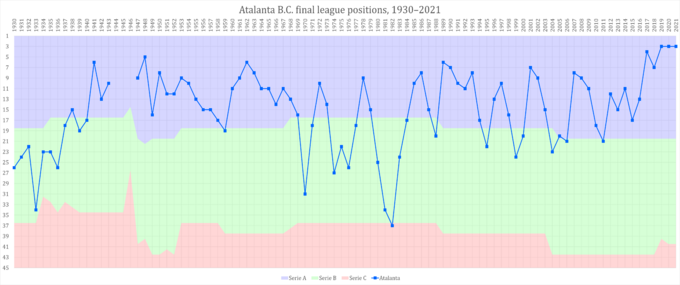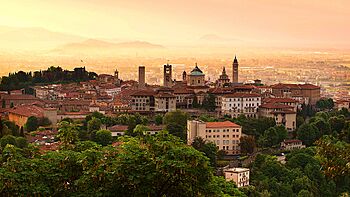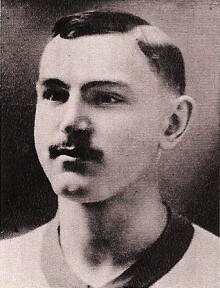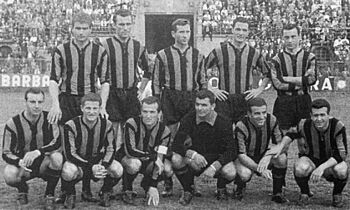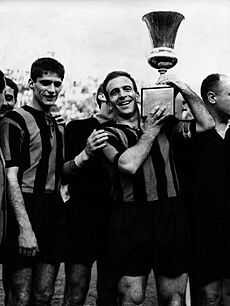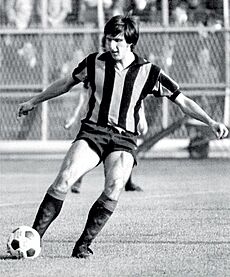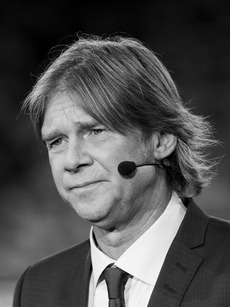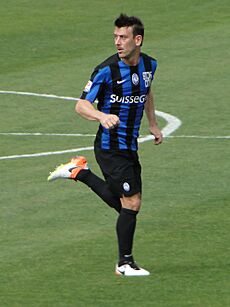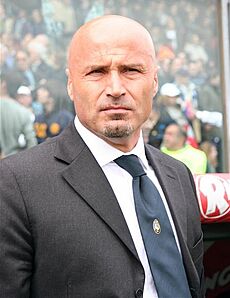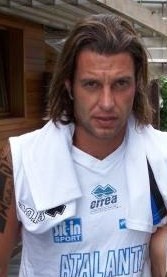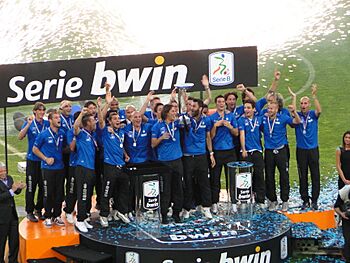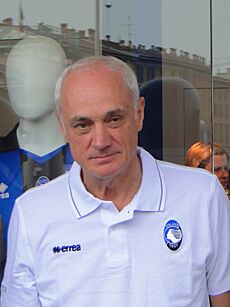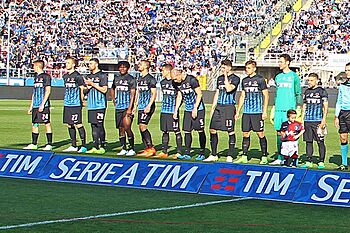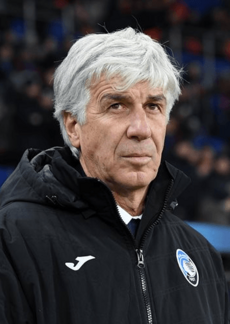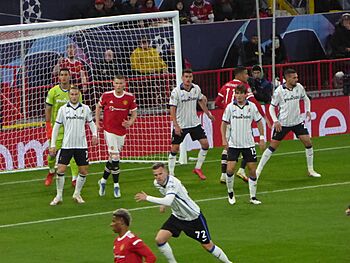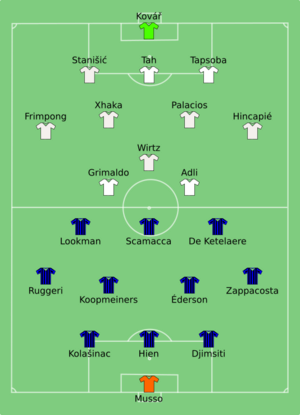History of Atalanta BC facts for kids
Atalanta Bergamasca Calcio, often called Atalanta, is a professional football club from Bergamo, Lombardy, Italy. Its history spans over 110 years, from its start in 1907 to today. The club is known by nicknames like La Dea (The Goddess) or the Nerazzurri (Black and Blues). Atalanta plays its home games at the Gewiss Stadium, which has been its home since 1928. Currently, the team competes in Serie A, Italy's top football league.
Atalanta was founded in 1907 by students from Liceo Classico Paolo Sarpi in Bergamo. It was named after Atalanta, a famous athlete from Greek myths. In 1920, the club joined with another Bergamo team. This is when it got its current name, Atalanta Bergamasca Calcio, and its black and blue colors. For many years, Atalanta played in the second division. It first reached Serie A in 1937. The club then stayed in Serie A for almost 30 years (1940–1969), only missing one season.
Later, Atalanta moved between the top two divisions often. It even spent one season (1981–82) in the third division. However, it returned to the top leagues and played in several UEFA competitions between 1987 and 1990. This included the European Cup Winners' Cup and two UEFA Cups, under coach Emiliano Mondonico. In the 1990s and 2000s, Atalanta again moved between Serie A and Serie B. The club was last promoted in 2011 and has been in Serie A ever since. Between 2017 and 2021, under coach Gian Piero Gasperini, the club had its best league finishes ever. It also played in the UEFA Champions League and UEFA Europa League.
As of the 2022–23 season, Atalanta has played 62 seasons in Serie A. It has spent 28 seasons in Serie B, winning it five times, and only one season in Serie C. Atalanta has spent more seasons in the top league than any other Italian club not from a regional capital. Because of its consistent play and Serie B wins, it is sometimes called the Regina delle provinciali ("queen of the provincial clubs"). However, it has never won the Scudetto (the Serie A title). Atalanta has won two major trophies: the Coppa Italia in 1963 and the Europa League in 2024. The club reached the Coppa Italia final five other times. Before winning the Europa League in 2024, its best European results were the Champions League quarterfinals in 2020 and the Cup Winners' Cup semifinals in 1988.
Contents
- How Atalanta Started (1900–1920)
- Between the Wars and First Serie A Appearance (1920–1940)
- Consistent in Serie A (1940–1959)
- Coppa Italia and European Games (1959–1971)
- Challenges and Comeback (1971–1986)
- Mondonico's Time and European Games (1986–1994)
- Ups and Downs (1994–2008)
- Changing Times and New Leaders (2008–2016)
- Gasperini's Era and New Heights (2016–present)
How Atalanta Started (1900–1920)
At the start of the 1900s, Bergamo had two main sports groups. These were the Società Bergamasca di Ginnastica e Scherma and the Giovane Orobia. Both were in the Città Alta (the "high city"). This made them hard to reach for people in the Città Bassa (the "low city"). The idea for Atalanta came from a group that wanted a sports club in the low city.
The first football club in Bergamo was Foot Ball Club Bergamo, started in 1904 by Swiss people. It played in regional games until 1911. Its remaining members joined Bergamasca, which then started its own football team in 1913.
Atalanta was founded on October 17, 1907. Students Eugenio Urio, Giulio and Ferruccio Amati, Alessandro Forlini, and Giovanni Roberti started it. The next day, they agreed to name the club Atalanta. This gave it the name Società Bergamasca di Ginnastica e Sports Atletici Atalanta. The new club quickly formed a football team. However, the Italian Football Federation (FIGC) didn't recognize it until 1914. Before this, the club only played friendly games. Its first official field was on Via Maglio del Lotto in Bergamo. It could hold 1000 fans.
Pietro Carimanti, a football director, strongly pushed for the club to be recognized. At this time, the club wore black and white uniforms. Atalanta also had teams in other sports like gymnastics and swimming. Three Atalanta athletes went to the Olympic Games. Guido Calvi and Alfonso Orlando went to the 1912 Olympics. Costante Lussana went to the 1920 Olympics.
After being recognized, Atalanta played in the 1914–15 Promozione. This was the second-highest league. In its first season, the club finished second in its group.
During World War I, official sports events stopped. Atalanta played in friendly tournaments with youth players. The club also had to sell its land due to money problems. After the war, Antonio Festa started the Circolo Studentesco (Student Circle). This aimed to bring football excitement back to the city.
In 1919, Atalanta restarted its activities. It had only eleven players. The club also needed a new field. A kind person named Betty Ambiveri sold the Campo della Clementina to the club. This new field was called the Atalanta Stadium. It could hold 14,000 fans.
Atalanta then wanted to join the Prima Categoria, the top league. But the FIGC said only one club from Bergamo could join. Atalanta and Bergamasca were rivals, so they played a game to decide. Atalanta won 2–0 in Brescia. Atalanta then finished third in its group, securing a spot in the next season's Prima Categoria.
In February 1920, the two Bergamo clubs decided to merge. The new club was named Atalanta Bergamasca di Ginnastica e Scherma 1907. It was later shortened to Atalanta Bergamasca Calcio. The merger finished on April 4, 1920. Enrico Luchsinger became the first president. After the merger, the team's colors were chosen. The black and white of Atalanta and the blue and white of Bergamasca combined into black and blue (nerazzurri). The club still has this name and these colors today.
Between the Wars and First Serie A Appearance (1920–1940)
In the first season after the merger, Atalanta finished fourth in its group. The next season, Atalanta finished third in its group in the FIGC championship. At the end of the 1921–22 season, Atalanta played its first game against a foreign team, a 2–2 draw with Swiss club Aarau.
In the 1922–23 season, Atalanta won its group in the Seconda Divisione. But the club was not promoted because the league system changed. After another third-place finish, Atalanta almost got relegated in 1924–25. It was saved by winning a playoff.
In 1925, Cesare Lovati became the club's first professional coach. The club also welcomed its first foreign players, Hungarian players Gedeon Eugen Lukács and Jeno Hauser. Lukács scored 13 goals that season.
In 1926, the FIGC changed rules to allow only one foreign player. So, Atalanta kept Lukács. In the 1926–27 Prima Divisione, Lukács scored 20 goals in 17 games. This included five goals in one match, a club record. This helped the club finish second in its group. Atalanta qualified for a promotion playoff but lost.
The club hired Hungarian coach Imre Payer in 1927. He was Atalanta's first foreign coach. This meant Lukács had to leave. Despite this, the club did well. It won its Prima Divisione group. By winning its group, Atalanta played in the national second division finals. Atalanta won the final playoff match 3–0. This was its first second division win and earned promotion to the top league.
In 1928, a new stadium was built for the club. It was much bigger, holding 12,000 fans. It also had a running track. The stadium was first named after a fascist leader, which was common in fascist Italy. On November 1, 1928, the new stadium hosted its first game. The official opening was on December 23, 1928, with over 14,000 fans. Atalanta won 2–0.
During the 1928–29 season, young goalkeeper Carlo Ceresoli made his debut. He later played for Inter Milan and won the 1938 FIFA World Cup with Italy. At the end of the season, Atalanta did not finish high enough. So, it was not admitted to Serie A, the new top league. Instead, Atalanta joined the new second tier, Serie B.
Hungarian player-manager József Viola coached for the next few seasons. The club almost reached Serie A several times. It came closest in 1931, finishing sixth. During these years, players like Vittorio Casati, who played the most games for Atalanta in Serie B, were important. By the end of the 1931–32 season, the club had money problems. It had to sell Ceresoli to Inter. The club's struggles continued. It only avoided relegation to the third tier because Serie B expanded in 1933.
The club finished in the middle of Serie B for the next few seasons. It also won a fair play trophy in 1935–36. On November 7, 1935, Atalanta played its first Coppa Italia match, losing 2–0. In the 1936–37 season, under coach Ottavio Barbieri, Atalanta got its first promotion to Serie A. It finished second in Serie B.
Atalanta played its first Serie A game on September 12, 1937, a 0–0 draw. A week later, it played its first home game in Serie A against Juventus. Over 15,000 fans watched Atalanta lose 1–0. Despite early excitement, the club won only four matches that season. This led to a second-to-last finish and relegation to Serie B.
After this, Atalanta quickly returned to the top league. It almost got promoted in 1939. The next season, president Nardo Bertoncini hired new coach Ivo Fiorentini. Atalanta finished first in the 1939–40 Serie B and was promoted to Serie A. This was achieved without a single home defeat. Striker Giovanni Gaddoni scored 25 goals.
Consistent in Serie A (1940–1959)
When Atalanta returned to Serie A in 1940–41, it beat Juventus 3–0 for the first time. It also defeated the reigning champion, Bologna. The club finished sixth. Because of its good play, Atalanta earned its nickname, Regina delle provinciali ("queen of the provincial clubs"). Atalanta stayed in Serie A under Hungarian coach János Nehadoma until the league stopped due to World War II in 1943.
After the war, a senator named Daniele Turani invested in the club. Atalanta finished in the middle of the table in its first post-war season. Famous player Giuseppe Meazza played for the club that year. The stadium was renamed the Stadio Comunale ("City Stadium"). With borders open again, Atalanta could sign foreign players. Hungarian midfielder Mihály Kincses and attacker Sándor Olajkár played for Atalanta in 1946–47.
Over the next few years, the club played well in the top league. It earned a reputation as the provinciale terribile (terrible provincial team). This included four wins against the Grande Torino team, which won the league every season between 1945 and 1949. In 1947–48 Serie A, Atalanta finished fifth under coach Ivo Fiorentini. This was the club's highest league finish until 2017. As a result, goalkeeper Giuseppe Casari and midfielder Giacomo Mari were the first Atalanta players called to the Italy national team.
The next season was harder. Fiorentini resigned in March 1949. The club only avoided relegation on the last day. For the 1949–50 season, Giovanni Varglien became the new coach. The FIGC also allowed three foreign players per team. This let the club sign Danish forwards Jørgen Sørensen and Karl Hansen. Swedish midfielder Bertil Nordahl was already there.
Under Varglien, Atalanta was at the top of the Serie A table after two matches. The first was a 6–2 win against Bologna, with Hansen scoring three goals. The club finished eighth, but scored 66 goals, a club record at the time. Three players scored over ten goals: Hansen (18), Sørensen (17), and Emilio Caprile (14).
In the early 1950s, the club continued to play well in Serie A. It also helped young players like Battista Rota and Giulio Corsini start their careers. In 1954, the club sold Rota and hired Luigi Bonizzoni as coach. The 1954–55 season was tough for Atalanta's offense. The team avoided relegation thanks to 16 goals from Danish midfielder Poul Rasmussen. Atalanta also had the second-best defense in Serie A.
In 1955, Atalanta played in the first football match shown on RAI (Italian TV). This was a 2–0 home win. Two years later (1957–58), the club was at the bottom of the standings. It only escaped relegation on the last day. However, the club was accused of match fixing and was relegated by the FIGC. Atalanta appealed but lost. However, the club quickly returned to Serie A by winning Serie B under Austrian coach Karl Adamek. In November 1959, it was found that the match-fixing claims were false. The club received an amnesty.
Coppa Italia and European Games (1959–1971)
Important foreign players joined in the late 1950s and early 1960s. These included Argentine forward Humberto Maschio, Danish midfielder Flemming Nielsen, and Swedish captain Bengt Gustavsson. Atalanta also played in European competitions for the first time. It played in the Coppa dell'Amicizia (Friendship Cup) in 1959, 1960, and 1961. The club reached the semifinals of the 1961–62 Mitropa Cup. It also played in the Coppa delle Alpi in 1963, losing the final to Juventus.
After finishing sixth in the league in 1961–62, Atalanta won its first major trophy, the 1962–63 Coppa Italia. The team was led by coach Paolo Tabanelli and captain Piero Gardoni. To reach the final, Atalanta beat several teams. The final was against Torino. Atalanta won 3–1 thanks to three goals by striker Angelo Domenghini. After this win, Tabanelli's contract was not renewed. He was replaced by Carlo Quario. By winning the Coppa Italia, Atalanta qualified for the 1963–64 European Cup Winners' Cup. This was the club's first time in a major UEFA competition. However, the club was knocked out in the first round by Portuguese club Sporting CP.
On February 2, 1964, Atalanta lost 7–1 at home. This was the club's worst home defeat. Fans were very angry. Quario was fired and replaced by Carlo Ceseroli. The club finished in the middle of the standings. Later in the 1960s, Atalanta played in other European cups like the Intertoto Cup and Mitropa Cup. The 1967–68 season saw Atalanta barely avoid relegation. Coach Tabanelli was replaced by former captain Stefano Angeleri. However, the club was relegated in 1969, ending ten years in the top league.
The next season, Atalanta had three different coaches. It also had a negative club record of 772 minutes without scoring. These results saw Atalanta fall in the standings. It only avoided relegation to Serie C (the third tier) on goal difference. Results improved the next season under new coach Giulio Corsini. He brought in many young players like defenders Gaetano Scirea and Giovanni Vavassori. He led the team to promotion at the end of the season.
Challenges and Comeback (1971–1986)
Back in Serie A, Atalanta finished tenth in 1972. But it was relegated in 1973 after only two years. At the start of the 1972–73 season, Atalanta did not let in a goal in its first six matches. It was seen as very strong defensively. But then it lost 9–3 to Milan, which shocked everyone. Atalanta struggled and was relegated on the last day.
After this, the club spent four years in Serie B. In 1975–76, Giancarlo Cadé became coach. The club also got young winger Antonio Cabrini. But the club could not get promoted. Cadé resigned, and former player Gianfranco Leoncini took over. He led the club to three wins and safety. Leoncini was replaced by Battista Rota. Cabrini also moved to Juventus and later won the 1982 FIFA World Cup with Italy.
The next season, under Rota, Atalanta finished third in Serie B. It was promoted to Serie A through playoffs. In 1978, the club stayed in Serie A, finishing ninth. However, in the 1978–79 season, Atalanta did not win a Serie A match until game 14. The club was eventually relegated again.
After Atalanta was relegated in 1979, president Achille Bortolotti passed the role to his son Cesare. The club had a tough start to the 1980–81 season. Several big clubs like Milan were also in Serie B due to a past issue. Atalanta fell to the bottom of the Serie B table. Coach Bruno Bolchi was fired. Giulio Corsini took over, but results did not improve. The club was relegated to Serie C1 for the first time. This was a big shock for the club and its fans.
Many changes happened that summer. Ottavio Bianchi became coach for the 1981–82 Serie C1 season. Atalanta showed its strength and won promotion back to Serie B after just one season. The club won its group with 49 points, losing only twice. Atalanta spent the next two seasons in Serie B. It won the 1983–84 tournament to return to Serie A. That season, striker Marco Pacione and playmaker Marino Magrin were top scorers. In 1984, Swedish player Glenn Strömberg joined the club. He stayed for eight years and became captain.
Mondonico's Time and European Games (1986–1994)
Atalanta stayed in Serie A until 1987. It was relegated on the last day. Despite being relegated, the club reached its second Coppa Italia final. It lost to Napoli, who also won the league. Since Napoli qualified for the European Cup, Atalanta got the Cup Winners' Cup spot. This was the club's second time in this competition.
The 1987–88 season was a big moment for the club. Under coach Emiliano Mondonico, Atalanta got promoted to Serie A. This was despite playing in two competitions at once. In the Cup Winners' Cup, the club reached the semifinals even though it was in Serie B. Atalanta lost its first match away but recovered with a home win. It then beat Greek and Portuguese clubs. In the semifinals, Atalanta lost to Belgian club K.V. Mechelen. This run to the semifinals was the best performance in a UEFA competition by a club not in its country's top league.
Back in Serie A, Strömberg became team captain. Atalanta brought in young goalkeeper Fabrizio Ferron and Brazilian forward Evair. In its first season after promotion, Atalanta finished sixth in Serie A. It qualified for the UEFA Cup for the first time. However, the club was knocked out in the first round. Atalanta also reached the Coppa Italia semifinals. In the 1989–90 season, Atalanta signed Argentine forward Claudio Caniggia. The club finished seventh in Serie A and qualified for the UEFA Cup again. Atalanta also beat Juventus away twice in a row.
The end of the 1989–90 season was sad. President Cesare Bortolotti died in a car accident. His father Achille briefly took over. Then, former player and businessman Antonio Percassi bought the club.
In 1990, Mondonico left Atalanta. Pierluigi Frosio replaced him. Under new management in the 1990–91 season, Atalanta reached the quarter-finals of the UEFA Cup. It beat Croatian, Turkish, and German clubs. Despite reaching the quarter-finals, the club replaced Frosio with Bruno Giorgi mid-season. Atalanta was then knocked out of the UEFA Cup by Italian rival Inter. In Serie A, Atalanta finished in the middle of the table. Percassi also worked to improve the club's youth system. In 1991, he hired Fermo (Mino) Favini as a scout. He found many promising players. The club won its first national youth championship in 1993.
From 1992, the Bortolotti Cup was held each year to remember the presidents. In the following years, Atalanta finished in the upper middle of Serie A. But it did not qualify for European competitions. It came closest in 1993 under coach Marcelo Lippi. The club needed a win on the last day to qualify for the UEFA Cup, but lost. Percassi wanted to make the club more ambitious. He hired coach Francesco Guidolin for the 1993–94 season. Atalanta also bought Franck Sauzée, a European champion. Despite these new players, Atalanta had a bad season. Guidolin was fired after ten matches. Cesare Prandelli took over but could not save the club from relegation. In 1994, the stadium was renamed the Stadio Atleti Azzurri d'Italia.
Ups and Downs (1994–2008)
In February 1994, Percassi sold the club to businessman Ivan Ruggeri. Ruggeri brought Mondonico back as coach. He led Atalanta back to Serie A, just like he did in 1988. While in Serie B, the club played in the 1994–95 Anglo-Italian Cup. This was its last international cup for 22 years. Despite a tough start, the club won seven games in a row. It secured promotion on the last day.
The next few years, Atalanta finished in the middle of Serie A. In the 1995–96 season, Christian Vieri led the attack. The club reached its third Coppa Italia final but lost to Fiorentina. Future Champions League and World Cup winner Filippo Inzaghi led the attack in 1996–97. Inzaghi scored 24 goals, becoming the league's top scorer (Capocannoniere). He is the only Atalanta player to win this award. The 1996–97 season was also sad. In February 1997, 22-year-old forward Federico Pisani died in a car accident. The club retired his shirt number (14). The Curva Nord of the stadium was named Curva Pisani in his honor.
In the 1997–98 season, Atalanta struggled. It had sold its main attackers. The club fell towards the relegation zone. Relegation was confirmed on the last day. Mondonico was fired. Former player Bortolo Mutti became the new coach for the 1998–99 season. The club finished sixth in Serie B, missing promotion.
Another former player, Giovanni Vavassori, became head coach in 1999. The club also invested a lot in its youth system. Atalanta often lacked money to buy world-class players. So, it focused on developing young talent. Under Vavassori, and with homegrown players, the club was promoted to Serie A. One of these players was defender Gianpaolo Bellini. He played his entire career at Atalanta, making 435 appearances, the most for any player. Atalanta started the 2000–01 season in Serie A well. It finished seventh, close to UEFA Cup qualification. Many young players made their top-league debuts.
In 2001, Ruggeri sold young players to bigger teams. He used the money to bring in more famous players. But the new players did not fit well. Atalanta finished ninth that season. The 2001–02 season also saw good play from attacking midfielder Cristiano Doni. He scored 16 goals and was called up to the Italy national team.
Atalanta struggled in the 2002–03 season. It had many draws and losses. Vavassori was fired. The club was relegated after losing a playoff. Former coach Andrea Mandorlini took over. In the 2003–04 Serie B season, Atalanta had a 24-match unbeaten run. The club finished fifth and was promoted to Serie A. After a bad start in Serie A, Mandorlini was fired. Delio Rossi took his place. The club was relegated after just one season back in Serie A.
In 2005, the club hired young coach Stefano Colantuono. In his first season, he led the team back to Serie A. The club won the 2005–06 Serie B with a club record 24 wins. Atalanta continued to do well in Serie A in 2006–07. It finished eighth, close to UEFA Cup qualification. Colantuono left for Palermo. Atalanta replaced him with Luigi Delneri.
Changing Times and New Leaders (2008–2016)
In January 2008, president Ivan Ruggeri had a health issue. His son Alessandro became president, and his daughter Francesca became vice president. Atalanta stayed in the middle of the standings. It finished ninth and did not qualify for European games. In September 2008, Alessandro officially became club president. In the 2008–09 season, the club had many good results. It beat several top teams.
Alessandro Ruggeri hired Angelo Gregucci as the new coach. But Gregucci was fired on September 21, 2009, after four losses. Antonio Conte took over. Under Conte, the club had some wins and draws. But then it had many poor results. Conte had an argument with fans and resigned in January 2010. Primavera coach Valter Bonacina took over for one match. Then Bortolo Mutti returned as coach. Under Mutti, Atalanta fought to stay up. But results did not improve, and the club was relegated to Serie B. On May 14, 2010, the Ruggeri family sold the club. Antonio Percassi bought 70% of the shares on June 4. He returned as club president after sixteen years.
At the end of the 2009–10 season, Mutti left. Stefano Colantuono returned as coach. Under his leadership, Atalanta was promoted to Serie A after only one season in Serie B. Atalanta won Serie B with 79 points. This was the club's second-best Serie B performance.
The next summer, captain Cristiano Doni was involved in a past football issue. Atalanta faced a six-point penalty in the 2011–12 Serie A standings. Doni was banned from football for three and a half years, ending his career. Defender Thomas Manfredini was also accused but later cleared. That summer, Atalanta signed Argentine forward Germán Denis. He became one of the club's top scorers. At the start of the season, Atalanta got 10 points in its first four matches. The club went on to get 52 points before the penalty. This was a new club record for points in Serie A. The club stayed in Serie A with four games left.
On May 31, 2012, Atalanta received a two-point penalty for a past match. Doni received another two-year ban. In the 2012–13 season, Atalanta was in sixth place early on. Its performance dropped later, but the club stayed in Serie A with two matches to spare.
The 2013–14 season started with only three points in five matches. Then Atalanta won its next six games, a club record. The club stayed in Serie A with 46 points and seven matches left. It finished eleventh with 50 points.
Atalanta had a harder Serie A season in 2014–15. It risked relegation. Colantuono was fired and replaced by Edoardo Reja. Under Reja, Atalanta got 14 points in 13 games and finished 17th, just above the relegation zone. Reja led the club to a strong start in the 2015–16 season. But then the club went 14 matches without a win. Still, Atalanta finished 13th and stayed in Serie A.
Gasperini's Era and New Heights (2016–present)
Reja's contract was not renewed. Gian Piero Gasperini, Genoa's coach, replaced him. Atalanta started the 2016–17 season with only three points in five matches. Gasperini was at risk of being fired. However, with many young players joining the first team, the club's performance improved. Selling these players later helped the club financially. Atalanta bought its stadium in Bergamo in 2017. It became one of only four Serie A clubs to own its home stadium. This allowed the club to renovate the stadium.
On May 13, 2017, Atalanta secured a top-six spot in Serie A. This guaranteed qualification for UEFA competitions after 26 years. Thanks to a win on the last day, Atalanta finished fourth in Serie A. This was its best finish ever, beating its previous record of fifth in 1948. The club also set new records for total points (72) and wins (21) in Serie A. Many Atalanta players were called up to their national teams.
In the 2017–18 season, Atalanta finished seventh. This earned it a spot in the 2018–19 UEFA Europa League qualifying rounds. This was achieved despite playing in two competitions and a tough start. In the Europa League, the club finished top of its group unbeaten. It then reached the round of 32 but was knocked out by German club Borussia Dortmund. Atalanta also reached the Coppa Italia semifinals for the first time since 1996. In the league, Atalanta climbed to seventh place and stayed there.
Atalanta started the 2018–19 season by winning Europa League qualifiers. But it was knocked out by Danish club Copenhagen in a penalty shootout. At the start of the Serie A season, the club had some bad results. But Atalanta then recovered strongly. It won its next four matches, including a 4–1 win against Inter. The club scored 77 goals, its best ever. With a 3–1 win on the last day, Atalanta finished a record third. It qualified for the UEFA Champions League for the first time. The club also reached its fourth Coppa Italia final. It beat Juventus but lost the final to Lazio 2–0.
The 2019–20 season was Atalanta's Champions League debut. The club was in a group with Dinamo Zagreb, Shakhtar Donetsk, and Manchester City. Atalanta played its home Champions League matches at San Siro because its stadium was being renovated. Atalanta started its Champions League campaign with three losses. But it managed to qualify for the knockout phase after a draw and two wins. Atalanta became only the second club to advance after losing its first three matches. In Serie A, the club continued to do well. It had a 5–0 home win over Milan and a 7–0 away win over Torino, its largest Serie A victory. In the Champions League round of 16, Atalanta beat Spanish club Valencia 8–4. Striker Josip Iličić scored all four goals in the second game. The season then stopped for three months due to the COVID-19 pandemic. The Province of Bergamo was hit hard. The Atalanta–Valencia match was even called "Game Zero" as a possible source of the outbreak. The season restarted in June. Atalanta finished third in the league again and qualified for the Champions League. This season, the club set new records for points (78), goals scored (98), and consecutive Serie A wins (9). On August 12, the club lost to Paris Saint-Germain in the Champions League quarter-finals.
In the 2020–21 season, Atalanta was in a Champions League group with Liverpool, Ajax, and Midtjylland. The stadium in Bergamo was now approved to host Champions League matches. Atalanta beat Midtjylland and drew with Ajax. It lost 5–0 to Liverpool at home but won the return game 2–0. Atalanta qualified for the knockout phase. But it was knocked out in the round of 16 by Real Madrid. On May 15, 2021, Atalanta qualified for its third straight Champions League. The club also reached the Coppa Italia final again but lost to Juventus. The club finished third in the league, matching its record of 78 points. Many Atalanta players played for their national teams in UEFA Euro 2020 and the 2021 Copa América.
The 2021–22 season was not as good for Atalanta. In the Champions League, the club was in a group with Manchester United, Villarreal, and Young Boys. Atalanta finished third in the group and went to the Europa League playoffs. In the Europa League, the club beat Olympiacos and Bayer Leverkusen. But it was knocked out in the quarter-finals by RB Leipzig. This was still the club's best Europa League finish. In Serie A, Atalanta finished eighth. It failed to qualify for European competition for the first time since Gasperini joined. Many reasons were given, like injuries and market choices. In February 2022, American investor Stephen Pagliuca bought a 55% share of the club. He became co-chairman.
Gasperini stayed as coach. In July 2022, defender José Luis Palomino was suspended for a short time. This led to young players joining the first team. The 2022–23 season had a long break for the 2022 FIFA World Cup. Atalanta started the season with ten games unbeaten. The club had ups and downs but stayed in the top seven. It finished fifth, directly qualifying for the 2023–24 UEFA Europa League group stage.
On August 4, 2023, Atalanta started a reserve team in Serie C. Before the 2023–24 season, the club made its most expensive signing, forward El Bilal Touré. It also brought in Gianluca Scamacca and Charles De Ketelaere. Atalanta was in a Europa League group with Sporting CP, Sturm Graz, and Raków Częstochowa. It finished top of the group without losing. In the knockout stage, Atalanta beat Sporting CP again. It then faced Liverpool and won 3–1, including a 3–0 win at Anfield. Atalanta then beat Olympique Marseille 4–1 in the semifinal. This meant it reached its first ever final in a UEFA competition. The club also reached its third Coppa Italia final in six seasons. But it lost the final to Juventus 1–0. One week later, on May 22, 2024, Atalanta faced Bayer Leverkusen in the Europa League final in Dublin. Bayer Leverkusen had been unbeaten for 51 matches. Atalanta won the match 3–0 thanks to three goals by Ademola Lookman. This was the club's first major trophy since 1963 and Gasperini's first trophy as manager. The club also qualified for the next season's Champions League.
|
 | Kyle Baker |
 | Joseph Yoakum |
 | Laura Wheeler Waring |
 | Henry Ossawa Tanner |


